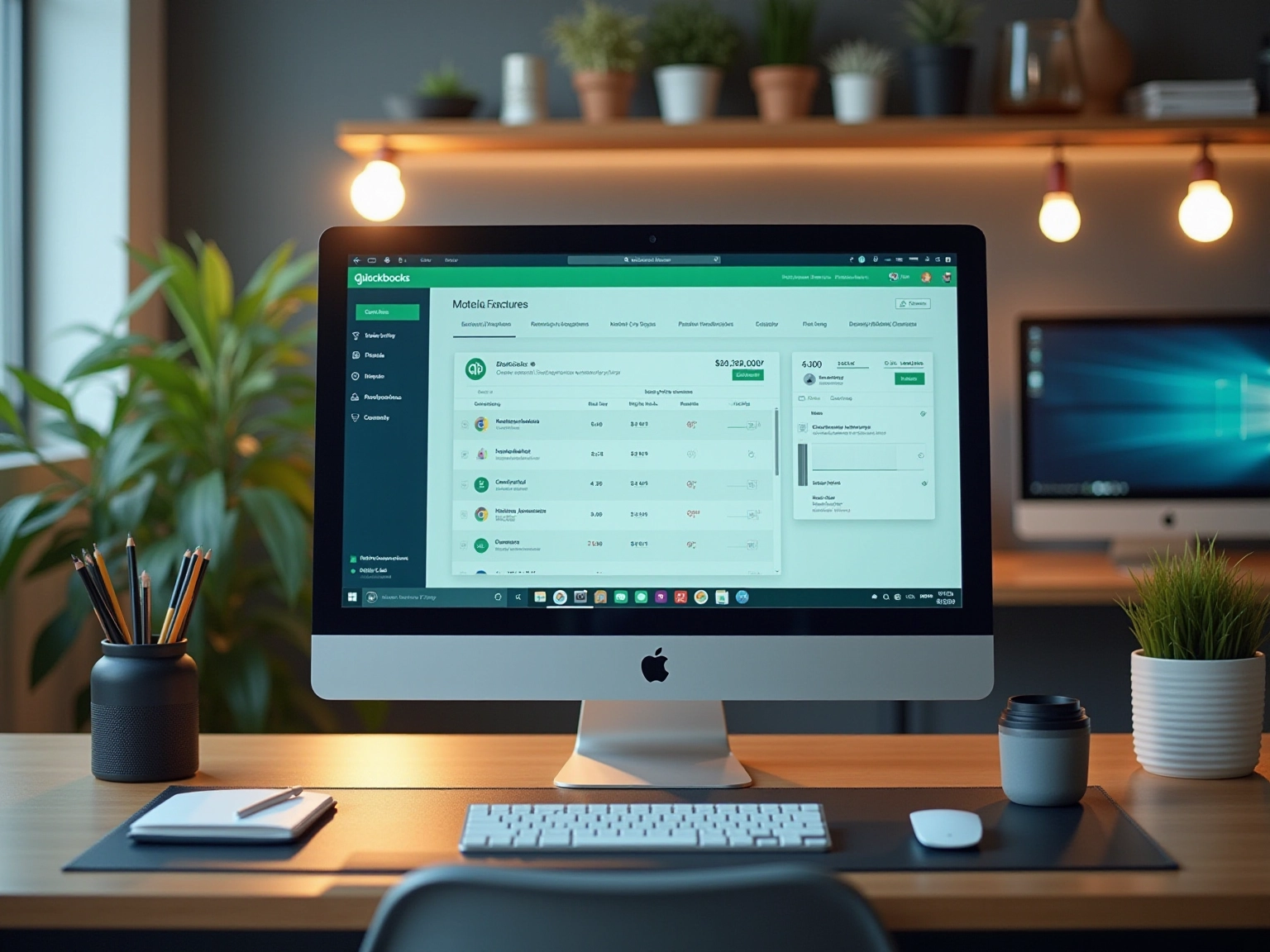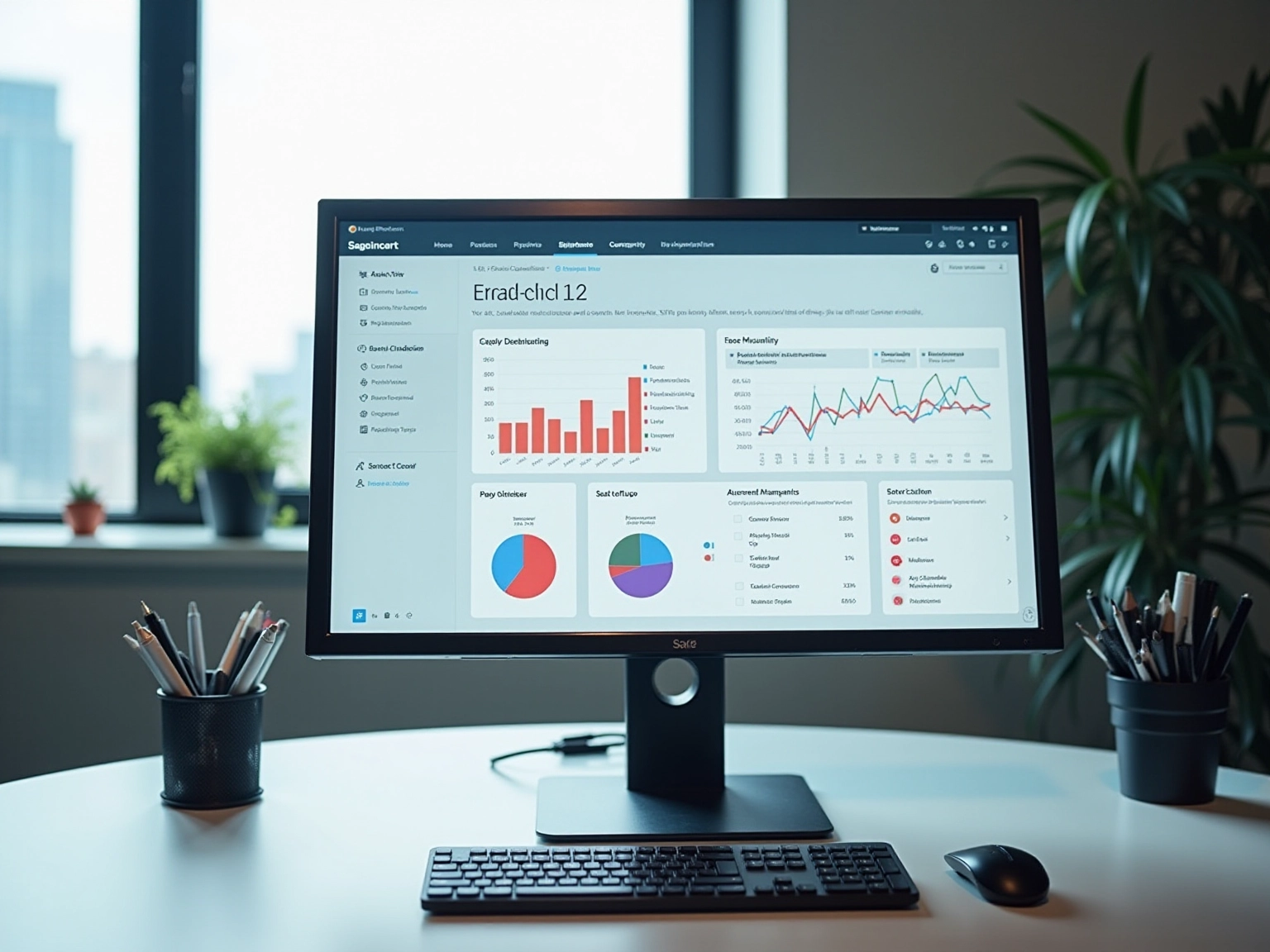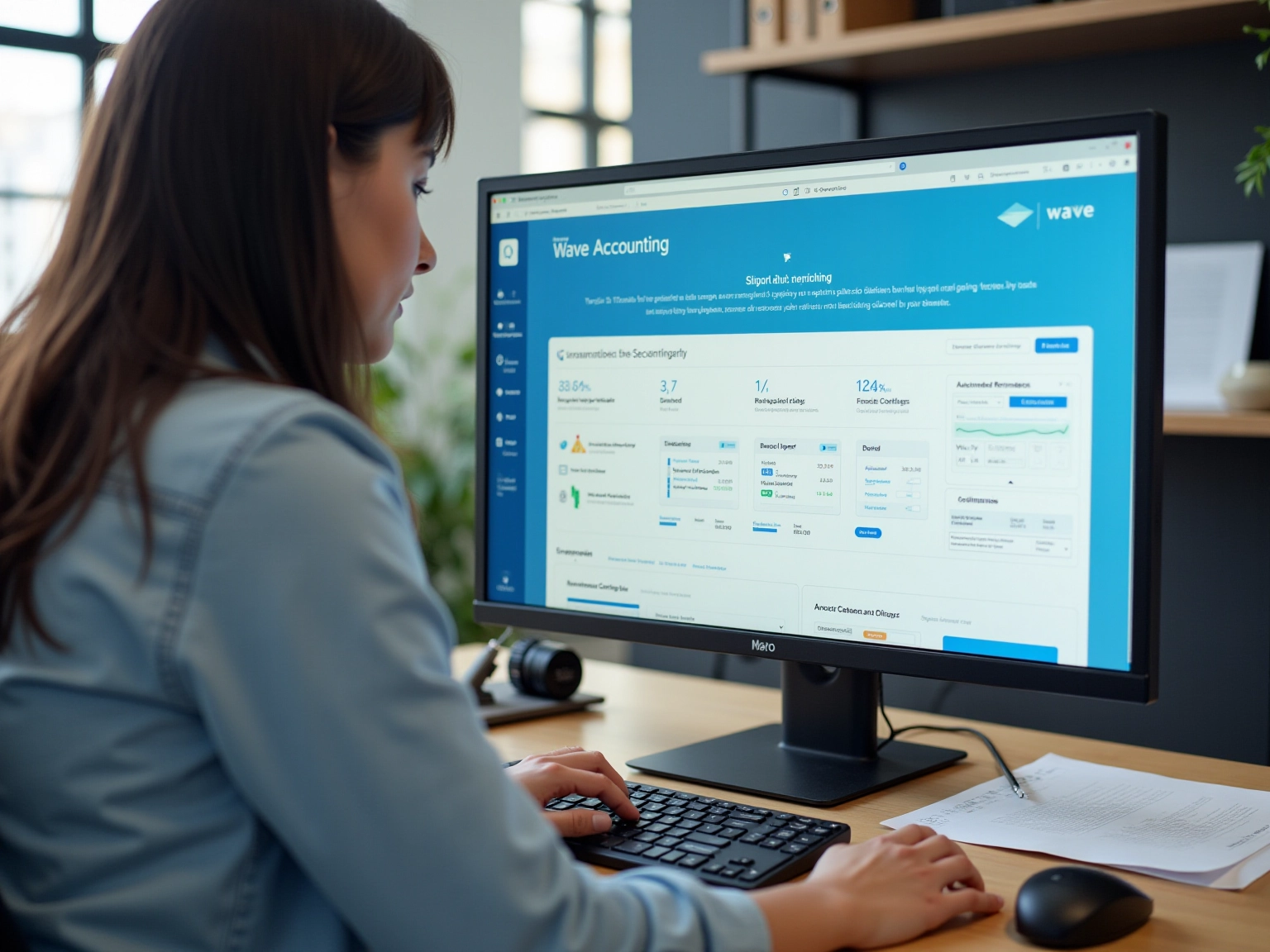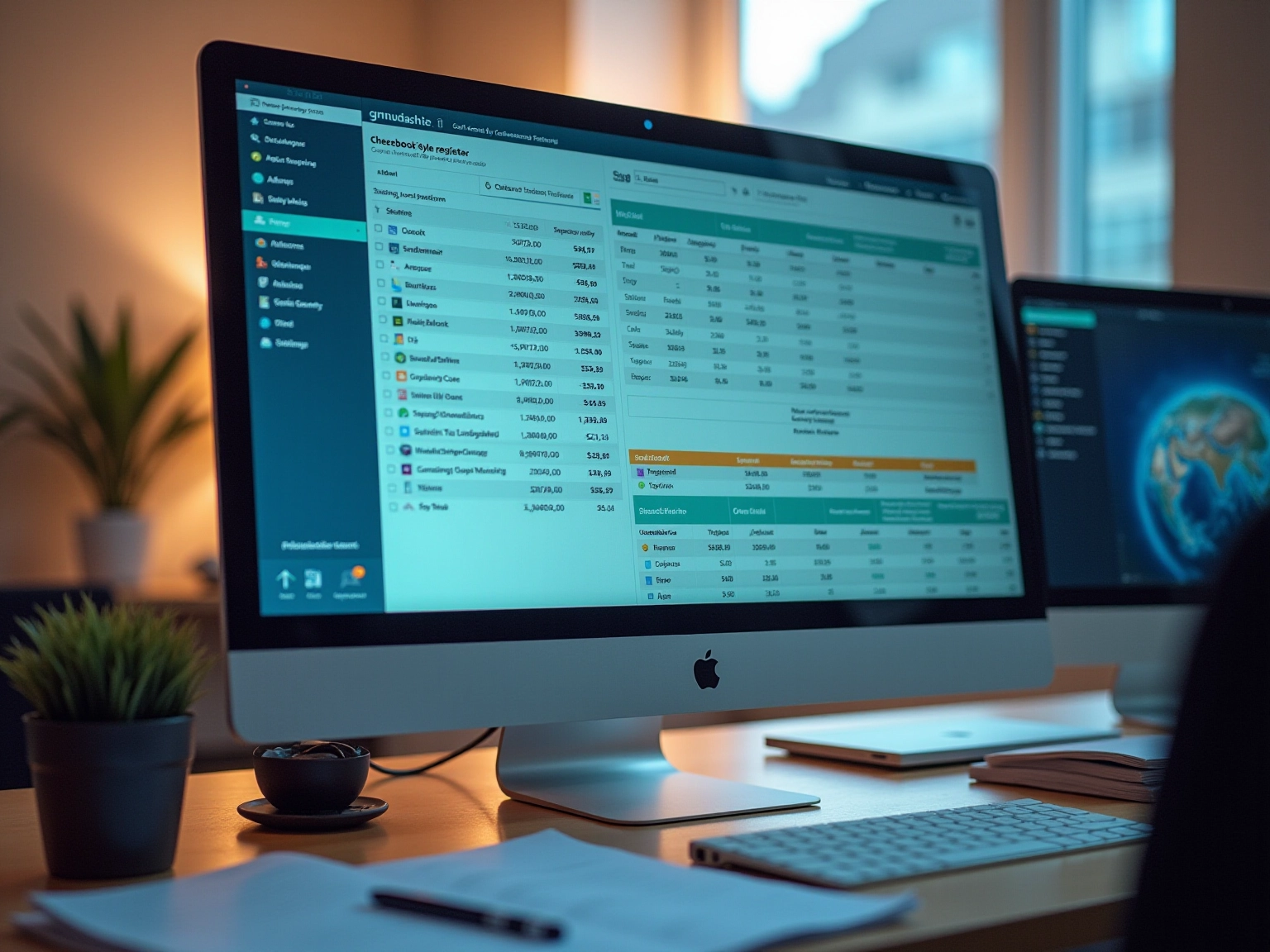Overview
The central inquiry raised by the title “Top 10 Best Accounting Apps for 2024: Streamline Your Financial Management” is which accounting applications stand out in enhancing financial management for the year 2024. This article identifies several leading accounting solutions, including:
- QuickBooks
- Xero
- Sage Intacct
It emphasises their features that automate tasks, improve data management, and enhance client communication. Such functionalities underscore their vital importance in contemporary financial practices.
Key Highlights:
- Accounting apps are essential tools for professionals, enhancing data management and communication.
- They automate repetitive tasks, allowing accountants to focus on strategic decision-making.
- Platforms like Glasscubes have improved customer interaction, increasing response rates by 40% and reducing response times by 50%.
- The global market for financial software is projected to reach $11.8 billion in the next eight years, indicating a growing reliance on these tools.
- QuickBooks offers extensive features for small businesses, including invoicing and payroll management, and saves users 20-27% in time on financial tasks.
- Xero provides seamless integration with over 800 applications, enhancing its functionality for small to medium-sized businesses.
- Sage Intacct is recognised for its advanced features, such as multi-entity management and real-time insights, which significantly improve financial management.
- FreshBooks simplifies invoicing and expense tracking, increasing customer engagement through automated reminders.
- Wave is a free accounting software that enhances customer engagement, achieving a 40% increase in response rates.
- Zoho Books offers comprehensive features for small businesses, improving automation and cash flow management.
- GnuCash is an open-source software providing flexibility and customization for accountants and small businesses.
- Microsoft Excel remains a critical tool for budgeting and forecasting, with over 80% of finance professionals still using it.
- Taxbit streamlines tax compliance and reporting, improving customer response times by 50%.
Introduction
In the dynamic realm of finance, accounting apps have emerged as indispensable tools for professionals who seek to enhance both efficiency and accuracy in their work. As remote collaboration and digital transactions gain prominence, these applications not only streamline data management but also promote improved communication between accountants and their clients.
With traditional methods increasingly becoming cumbersome, the integration of innovative software solutions is revolutionising the accounting profession. This transformation allows professionals to concentrate on strategic decision-making rather than getting bogged down by administrative tasks.
This article delves into various accounting applications, highlighting their distinctive features and the substantial advantages they provide to businesses navigating today’s competitive landscape.
Understanding Accounting Apps: A Modern Necessity
In today’s dynamic economic landscape, the most effective accounting apps have emerged as indispensable tools for professionals. They streamline data management, automate repetitive tasks, and significantly enhance communication between accountants and their clients. Traditional email communication often leads to long threads, misplaced information, and duplicated requests, making it challenging to track outstanding items.
As remote work and digital transactions become the norm, the most effective accounting apps are essential for ensuring accuracy and compliance in financial reporting. By harnessing technology, accountants can save substantial time, minimise errors, and redirect their focus toward strategic decision-making rather than getting bogged down by administrative duties.
Real-world examples illustrate the transformative impact of accounting apps. For instance, companies utilising platforms like Glasscubes have reported significant enhancements in customer interaction and data collection.
Audit managers, such as Steve from MGI, have received faster replies from customers and valued the clarity of having all information centralised. With Glasscubes, users can effortlessly view outstanding requests and upload required documents, resulting in a 40% rise in user response rates and a 50% decrease in response times. The platform’s automated reminders ensure that users are prompted to provide information on time, while real-time progress reports enable audit teams to monitor outstanding inquiries effectively.
These statistics highlight the necessity of adopting the most effective accounting apps in the finance profession. Furthermore, the global market for financial software is expected to reach $11.8 billion within the next eight years, according to Accounting Today, indicating the increasing acknowledgment of these applications’ significance. Financial professionals increasingly recognise that effective data management is crucial for success; a recent survey revealed that 50% of respondents identified their businesses as early adopters of digital tools.
This trend emphasises the essential function of the most effective accounting apps in enhancing operational efficiency and customer communication. Moreover, automating Accounts Payable processes can decrease paperwork by 90-95% and enhance efficiency by 20-27%, further underscoring the efficiency improvements from utilising financial applications. Additionally, Glasscubes is secure, encrypted, and GDPR compliant, offering reassurance for both companies and clients.
In conclusion, the integration of financial applications not only enhances data management but also cultivates stronger connexions between accountants and clients. As the industry continues to evolve, the necessity of these tools will only become more pronounced, making them vital for any finance professional aiming to thrive in a competitive environment.

QuickBooks: The All-in-One Solution for Small Businesses
QuickBooks stands out as one of the premier accounting applications for small businesses, recognised for its extensive features and user-friendly interface. This platform encompasses essential tools for invoicing, expense tracking, payroll management, and reporting, all seamlessly integrated into a single solution. A significant advantage of QuickBooks lies in its capacity to integrate effortlessly with a variety of third-party applications, greatly enhancing its functionality and enabling businesses to customise their management processes to meet specific needs.
The cloud-based version of QuickBooks empowers users to access their data from any location, a critical advantage for businesses with remote teams. In today’s work environment, where remote collaboration is increasingly prevalent, this flexibility is indispensable. Furthermore, QuickBooks is celebrated for its exceptional customer support, offering users a wealth of online resources, tutorials, and troubleshooting assistance that ensures a smooth onboarding experience. Statistics indicate that small businesses utilising QuickBooks can save an average of 20-27% in time spent on financial management tasks, thanks to its automation features.
This efficiency translates into substantial productivity gains, allowing business owners to concentrate on growth rather than administrative burdens. Additionally, QuickBooks commands a significant market share, with millions of users worldwide, underscoring its reliability and popularity among small business owners.
In the competitive landscape of accounting software, another compelling option is available for UK accountants. For example, Sophie Montgomery from TaxAssist Accountants reported saving an impressive 288 hours in just one tax season with the software, underscoring the potential for significant efficiency gains. Firms that have adopted Glasscubes have experienced a 40% increase in client response rates and a 50% reduction in response times, demonstrating its effectiveness in enhancing client engagement.
Moreover, Glasscubes provides a secure, GDPR-compliant platform, particularly relevant for UK accountants navigating regulatory requirements. The advantages of top accounting applications are further underscored by data indicating that automating an Accounts Payable process can reduce paperwork by 90-95% and enhance efficiency by 20-27%.
As the global accounting software market is projected to reach a value of $11.8 billion in the next eight years, selecting the best accounting applications for financial management is more crucial than ever. Expert opinions consistently highlight the benefits of utilising top accounting apps, such as QuickBooks, for managing finances, noting its ability to streamline processes and enhance accuracy. Small business owners have shared positive experiences, emphasising how QuickBooks has transformed their operations, enabling them to make informed decisions based on real-time data.
With its robust features and user-centric design, QuickBooks remains among the best accounting applications for small businesses striving to enhance their management capabilities in 2024.

Xero: Seamless Integration and User-Friendly Interface
Xero stands out with its intuitive user interface and exceptional integration capabilities, establishing itself as the ideal choice for small to medium-sized businesses. This cloud-based bookkeeping software offers an extensive array of features—including invoicing, bank reconciliation, and expense tracking—all designed to streamline financial management. The real-time financial performance dashboard empowers users to monitor their financial health at a glance, facilitating swift and informed decision-making.
By seamlessly integrating with over 800 external applications, Xero significantly enhances its functionality, allowing businesses to tailor their financial processes to their specific needs. This vast integration network is bolstered by a robust support system, ensuring users have access to assistance whenever required. Xero’s commitment to user satisfaction is reflected in its high ratings, with numerous small business owners praising its accessibility and efficiency in simplifying financial tasks.
As noted by Ezra Neil Cabrera, “Xero software has made financial management and bookkeeping for small businesses much more accessible with all of these capabilities.” Additionally, Xero boasts a security rating of 5/5, providing robust protection for user data. Its flexible pricing structure features three tiers: Early, Growing, and Established, catering to diverse business needs.
In summary, Xero not only enhances operational efficiency but also contributes to improved economic performance for its users.

Sage Intacct: Advanced Features for Growing Businesses
Sage Intacct stands out as a premier cloud-based management solution, recognised among the best accounting apps for expanding businesses that seek enhanced bookkeeping capabilities. With extensive features such as multi-entity management, project accounting, and sophisticated reporting tools, it caters to the diverse needs of modern enterprises. By leveraging automation, Sage Intacct significantly reduces manual processes, allowing finance teams to redirect their focus toward strategic initiatives rather than routine tasks.
The platform’s customisable dashboards deliver real-time insights into performance, empowering businesses to make informed, data-driven decisions. In today’s fast-paced environment, where timely information can yield a competitive edge, this capability is crucial. Additionally, Sage Intacct is lauded for its robust compliance features, ensuring that businesses in regulated industries can adhere to necessary standards without sacrificing efficiency. Statistics reveal that 95% of companies implementing Enterprise Resource Planning (ERP) systems, such as Sage Intacct, have experienced notable process improvements.
This trend underscores the growing recognition of automation’s pivotal role in enhancing management solutions. As businesses increasingly adopt Sage Intacct, they harness its automation capabilities to streamline accounting processes and bolster overall operational efficiency. In fact, companies utilising Sage Intacct have reported significant advancements in their financial management practises, showcasing the platform’s effectiveness in meeting the needs of expanding businesses in 2024.
Alongside Sage Intacct, another leading accounting app provides an engaging option for accountants, particularly in enhancing customer interactions and streamlining information collection. Users like Sophie Montgomery from TaxAssist Accountants have reported saving an impressive 288 hours in just one tax season, highlighting the efficiency gains achievable with this tool. Moreover, companies employing this platform have experienced a 40% increase in customer response rates and a 50% decrease in response times, illustrating its efficiency compared to conventional methods.
The platform effectively addresses common email inefficiencies by offering automated reminders, real-time tracking, and a secure, user-friendly interface that organises all correspondence. It also features a visual progress report, allowing users to clearly monitor outstanding requests, and guarantees secure, encrypted communication that complies with GDPR. The dedicated onboarding support provided by the company fosters a more structured and effective process for accounting firms, addressing the unique requirements and challenges faced by accounting managers in their pursuit of improved communication with customers.

FreshBooks: Simplifying Invoicing and Expense Tracking
This innovative tool is specifically designed for accountants, enhancing user engagement through efficient information gathering. The platform significantly decreases the time accountants allocate to follow-ups, with firms reporting a 40% increase in customer response rates and a 50% reduction in response times. This transformation is largely attributed to efficient communication processes, which involve structured interactions that eliminate the uncertainty of multiple email threads, ensuring that all exchanges are systematically archived and accessible.
A standout feature is its automated reminders, which ensure users respond promptly to information requests. This automation not only saves time but also maintains a smooth and timely workflow, allowing finance teams to focus on more critical tasks. Furthermore, real-time reporting enables finance teams to effortlessly track the status of customer requests, further optimising communication processes and enhancing transparency in audit procedures.
User feedback, such as that from Steve Baxter, Audit & Accounts Manager at MGI Midgley Snelling, underscores the significant time savings achieved with the platform. He noted that users have engaged thoroughly with the tool, resulting in quicker responses and improved transparency in the audit process. This feedback highlights the platform’s efficiency in addressing the common challenges faced by professionals in managing communications with their customers.
Overall, this solution stands out as a vital resource among the leading accounting apps for firms looking to enhance their information collection and engagement strategies. By leveraging the power of automated communication and real-time tracking, this platform proves to be an invaluable asset in the competitive landscape of financial software.

Wave: Free Accounting Software for Small Enterprises
Introducing a transformative solution for UK accountants, this innovative tool is meticulously crafted to enhance customer engagement through efficient information gathering. Positioned within the financial software sector, the company leverages cutting-edge technology to improve communication, enabling busy accountants to receive responses from customers in half the time compared to traditional methods such as email. By offering a secure, GDPR-compliant platform, this service effectively addresses the prevalent frustrations of missed communications and delayed responses, ultimately empowering firms to manage their workloads more efficiently.
The platform’s primary offerings include a comprehensive portal that streamlines the collection of personal tax, audit/accounts, and payroll information. With key features such as automated reminders, real-time reporting, secure file sharing, and white-labelling, financial teams can effortlessly track customer requests, significantly reducing the time spent on follow-ups and enhancing overall efficiency. Unlimited requests and storage capabilities eliminate the common limitations associated with email, such as file size restrictions and the risk of misdirected information.
This solution adeptly tackles the challenges of ineffective communication and information collection that many accounting firms face. By centralising customer interactions and automating reminders, the platform drastically cuts down the time accountants devote to pursuing individuals for information. Testimonials from users like Steve, an audit manager at MGI, underscore the substantial time savings and enhanced transparency in the audit process.
Steve noted that customers engage deeply with the platform, leading to quicker information uploads and a more seamless audit experience. Companies utilising the platform have reported a remarkable 40% increase in customer response rates and a 50% reduction in response times, illustrating the system’s effectiveness in streamlining workflows and boosting customer satisfaction.
What sets this platform apart from its competitors is its ability to enhance workflows and elevate customer satisfaction through an intuitive interface that requires no training. The distinct value proposition lies in its automated functions, which ensure comprehensive replies from users while providing real-time insights into the status of requests. Additionally, the platform offers various pricing options, including the Essential plan at £120 monthly, the Professional plan at £180 monthly, and the Advantage plan at £360 monthly, with user licence fees ranging from £18 to £38 per month.
By optimising communication with customers and offering dedicated onboarding support, this platform not only saves time but also fosters a more organised and efficient process for financial firms. This makes it an invaluable resource for accountants seeking to enhance their information gathering and customer engagement. Furthermore, Glasscubes is ISO27001 compliant, affirming its adherence to international standards for information security—an essential aspect for firms managing sensitive client data.

Zoho Books: Comprehensive Features for Small Business Owners
Zoho Books emerges as a formidable accounting software designed specifically for small businesses, offering a comprehensive suite of features that includes invoicing, expense tracking, and inventory management. Its automation capabilities significantly alleviate the burden of repetitive tasks, such as sending payment reminders and generating financial reports, allowing business owners to focus on strategic growth. With customisable dashboards and in-depth reporting, Zoho Books delivers crucial financial insights that empower users to make swift, informed decisions.
In 2024, Zoho Books continues to enhance its appeal through seamless integration with other Zoho applications, further expanding its functionality. This interconnectedness not only streamlines resource management but also cultivates a more cohesive operational environment for small businesses. Users have reported that these automation features have revolutionised their accounting processes, resulting in heightened efficiency and accuracy in financial management.
Real-world examples underscore the effectiveness of Zoho Books in action. Small business owners utilising its automation capabilities have realised substantial time savings and improved cash flow management. Notably, companies employing this solution, designed to address the challenges of traditional email communication, have witnessed a 40% increase in customer response rates and a 50% reduction in response times. The platform enhances communication by providing a secure environment where all information and inquiries are centralised, enabling users to easily track outstanding requests.
Unlike email, which often leads to misplaced or duplicated requests, this platform guarantees that all correspondence is systematically organised within each audit request. Furthermore, automated reminders and real-time reporting ensure that no information slips through the cracks, fostering confidence and efficiency in client interactions. Sophie Montgomery from TaxAssist Accountants reported saving 288 hours in a single tax season by using the platform, illustrating how its structured approach and automated workflows directly contributed to these significant time savings.
As a testament to its influence, statistics reveal that Zoho Books has captured a substantial share of the market, with a growing user base that highlights its relevance in the competitive landscape of financial software. Additionally, the dedicated onboarding support provided by the platform promotes a more organised process for accounting firms, enhancing user assistance and ease of implementation. Overall, Zoho Books is regarded as one of the premier accounting applications for small business owners seeking to optimise their financial management in 2024, while the enhancements in Zoho CRM ensure a comprehensive ecosystem of financial management tools.
Sridhar Vembu, the founder and CEO of Zoho, emphasises the significance of this interconnectedness in delivering value to users.
KashFlow: Automation and Compliance Made Easy
This innovative tool is expertly designed for UK accountants, enhancing customer engagement through efficient information collection. By automating processes such as customer communication and information requests, the platform significantly reduces the administrative burden on financial firms, allowing them to focus on delivering exceptional service to their clients. Its user-friendly interface requires no training, enabling accountants to navigate and utilise its features with ease.
In 2024, the company continues to distinguish itself in the accounting software industry by offering dedicated onboarding assistance and a customer success manager, which cultivates a more organised and efficient process for accounting firms. This support ensures that users can maximise the platform’s features from the outset, resulting in improved user interactions and streamlined workflows.
User experiences with Glasscubes have been overwhelmingly positive. For instance, Steve, an audit manager at MGI, noted that the platform has transformed their audit process by centralising interactions and automating reminders. He reported that customers have engaged thoroughly with the software, leading to faster uploads of information compared to traditional email methods.
This has fostered a more transparent workflow, where both customers and the audit team can monitor pending requests in real-time.
Moreover, companies utilising this platform have experienced a 40% increase in customer response rates and a 50% reduction in response times, underscoring the tangible benefits of adopting this tool. The case studies demonstrate how the platform effectively addresses common frustrations associated with missed communications and delayed responses, ultimately aiding firms in managing their workloads more efficiently. By centralising customer interactions and automating reminders, this platform not only saves time but also stands out as one of the premier accounting applications, promoting a more organised and efficient process for accountants while enhancing their information gathering and client engagement.
The service offers various pricing plans, including:
- Essential plan at £120 per month
- Professional plan at £180 per month
- Advantage plan at £360 per month
User licence fees range from £18 to £38 per month. This pricing model, coupled with robust features and dedicated support, positions Glasscubes as an appealing choice for financial firms aiming to enhance their client interactions.
GnuCash: Open Source Flexibility for Accountants
GnuCash stands out as a robust, free, open-source financial software that offers remarkable flexibility and customisation for its users. Supporting double-entry accounting, it allows accountants and small business owners to meticulously monitor income, expenses, and investments, ensuring comprehensive oversight of resources. The intuitive chequebook-style register simplifies transaction management, while advanced reporting features provide valuable insights into economic performance, empowering users to make informed decisions.
While GnuCash may lack the polished interface of some commercial alternatives, its open-source nature is a significant advantage. Users can modify and adapt the software to meet their specific needs, making it an ideal choice for those who prioritise customisation and control over their financial management processes. In 2024, GnuCash continues to evolve, offering enhanced customisation options that cater to diverse user demographics, including freelancers, small businesses, and accountants seeking tailored solutions.
Alongside GnuCash, tools such as collaborative platforms are essential for modern accountants. These platforms provide real-time visibility into request statuses and offer specialised onboarding support, greatly improving customer engagement and simplifying information collection. Users of the platform, like TaxAssist Accountants, reported saving an impressive 288 hours in just one tax season and experienced a 40% increase in client response rates.
These statistics underscore the effectiveness of Glasscubes in optimising workflows and improving communication, transforming the audit process by overcoming traditional communication inefficiencies.
Real-world examples illustrate GnuCash’s adaptability; many accountants have successfully customised the software to streamline their workflows and improve efficiency. For instance, a case study involving a small financial firm revealed that by leveraging GnuCash’s flexible features, they were able to reduce their monthly reconciliation time by 30%, allowing them to focus more on strategic financial advising.
Expert opinions emphasise GnuCash’s versatility as a key strength, with numerous users commending its capacity to adjust to different financial requirements without the limitations often present in proprietary software. User testimonials further reinforce this sentiment, with one accountant noting, “GnuCash has transformed the way I manage my finances; its customisation options allow me to tailor the software to my unique workflow, making my job significantly easier.”
Moreover, as the financial profession evolves, it is crucial for accountants to enhance their analytical skills and adapt to big data, which includes diverse data types beyond traditional numerical data. As observed by Richins et al., pursuing further education in business strategy and business models can enhance existing financial knowledge, making it essential for professionals to remain competitive in a swiftly evolving environment.
In summary, GnuCash remains one of the best accounting apps for accountants and small business proprietors in 2024, offering a blend of flexibility, customisation, and robust accounting features that meet the evolving needs of management. Coupled with tools like Glasscubes, accountants can significantly improve their client engagement and operational efficiency, ensuring a more streamlined and effective audit process.

Microsoft Excel: The Classic Tool for Financial Management
Microsoft Excel stands as an indispensable tool in budget management, celebrated for its versatility and adaptability. Accountants leverage Excel to create tailored spreadsheets for budgeting, forecasting, and comprehensive economic analysis. Its powerful formulas and functions enable users to perform complex calculations and generate insightful reports that guide decision-making.
In an era where specialised financial software is on the rise, Excel’s familiarity and flexibility ensure its continued relevance. As of 2024, a substantial percentage of accountants still employ Excel alongside specialised financial platforms, thereby enhancing their financial management capabilities. This synergy fosters a more sophisticated approach to data management, where Excel’s strengths in customisation complement the automation features of accounting software.
The platform exemplifies how tools can enhance customer interaction and streamline information collection. With functionalities such as automated reminders and real-time reporting, it empowers accountants to effectively manage communications with clients and track outstanding requests. As noted by Steve, an audit manager at MGI, the transition to Glasscubes has significantly improved response times from customers, who appreciate the transparency of having all information in one secure workspace.
This efficient communication not only mitigates the inefficiencies of lengthy email exchanges but also cultivates a collaborative environment where clients can effortlessly upload necessary documents and monitor their submissions.
Real-world examples underscore Excel’s influence on budgeting and forecasting. Numerous companies report increased accuracy in their projections when utilising Excel to model various scenarios. Furthermore, accountants have observed that Excel’s user-friendly interface facilitates rapid adjustments to budgets, allowing for timely responses to evolving business conditions.
Current statistics reveal that over 80% of finance professionals utilise Excel, underscoring its status as a cornerstone in financial management. Additionally, Microsoft is investing US$80 billion in AI technology, reflecting the ongoing evolution of financial management tools. As Joseph D’Souza, Founder of ElectroIQ, remarked, “Microsoft is spending US$80 billion to invest in AI technology, and part of it includes introducing Microsoft 365 Copilot, an AI-powered assistant designed to enhance individual productivity and efficiency.”
The case study of this platform illustrates how tools like Excel can augment specialised accounting software, improving client interaction and simplifying information collection. The company offers various pricing options, including:
- A monthly account charge of £120 for the Essential plan
- £180 for the Professional plan
- £360 for the Advantage plan
User licence fees range from £18 to £38. As businesses continue to navigate complex financial landscapes, Excel’s role in enhancing budgeting and forecasting processes remains vital, solidifying its status as a timeless resource for organisations of all sizes.
Moreover, this platform ensures data security through fully encrypted services and compliance with GDPR, establishing it as a reliable choice for accountants.
Taxbit: Streamlining Tax Compliance and Reporting
The innovative accounting tool is expertly crafted for UK accountants, specifically designed to simplify customer engagement and streamline information gathering. This platform enhances tax compliance and reporting procedures, empowering accountants to manage customer information effectively while adhering to regulatory standards. With an intuitive interface, the platform significantly reduces the time and effort required for accountants to collect essential information from clients.
A standout feature is its automated reminders and real-time reporting capabilities, which bolster communication and ensure accountants receive timely responses from customers. This is particularly advantageous for companies managing numerous clients, as it facilitates effortless monitoring of requests and minimises the risk of overlooked communications.
The impact of this tool on response efficiency is remarkable. Companies utilising this platform have reported a 40% increase in customer response rates and a 50% reduction in response times. For example, Steve, an audit manager at MGI, noted that transitioning to the new platform has transformed their audit process.
He observed that users engage thoroughly with the platform, resulting in quicker uploads of requested information compared to traditional email methods. This has fostered a more transparent workflow where both clients and the audit team can view outstanding requests in real-time, significantly enhancing operational efficiency.
Moreover, testimonials from users underscore the platform’s importance in streamlining tax compliance processes. As companies increasingly adopt this platform, they experience improved customer engagement and more efficient workflows. The unique value proposition of Glasscubes lies in its ability to centralise client interactions and automate reminders, making it an indispensable tool for accountants seeking to elevate their information gathering and client engagement strategies.
Conclusion
The rise of accounting applications signifies a pivotal transformation in the financial landscape, equipping professionals with essential tools to enhance efficiency and accuracy. By streamlining data management and automating repetitive tasks, these applications not only facilitate improved communication between accountants and their clients but also liberate valuable time for strategic decision-making. Platforms such as QuickBooks, Xero, and Sage Intacct exemplify how technology integration into accounting practices is becoming indispensable for success in a competitive environment.
Real-world examples vividly illustrate the tangible benefits of these applications. Firms utilising tools like Glasscubes have reported remarkable enhancements in client engagement, evidenced by increased response rates and reduced turnaround times. The statistics are compelling, demonstrating how automation can lead to significant reductions in administrative burdens and heightened operational efficiency. As the global market for accounting software continues to expand, the recognition of these tools’ importance is increasingly pronounced.
Ultimately, adopting accounting applications is no longer an option but a necessity for finance professionals striving to excel in today’s digital age. The capacity to adapt to new technologies and leverage them effectively will not only streamline operations but also cultivate stronger client relationships. As the accounting profession evolves, those who invest in these innovative solutions will be better positioned to navigate the complexities of modern financial management and propel their businesses forward.
